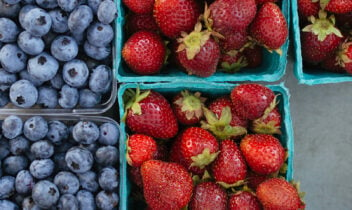TheBUZZ You should always eat organic fruits and vegetables?
WHAT THEY’RE SAYING
Organic fruits and vegetables are nutritionally superior to fruits and vegetables grown with pesticides.
WHAT WE KNOW
The USDA defines an organic food as a food that’s produced by farmers who emphasize the use of renewable resources and conservation of soil and water to enhance environmental quality. Organic meat, poultry, eggs, and dairy products are given no antibiotics or growth hormones. Organic foods (fruits and vegetables) are produced without the use of hormones, herbicides, pesticides, antibiotics, or synthetic fertilizers.
With talk in the media today about harmful effects of pesticides, organic farming has been promoted by some as the safest and healthiest way to eat your food. The USDA currently does not make any statements about organic foods being healthier or better for you than non-organic foods.
HOW DO WE KNOW THIS?
An analysis of 46 studies was conducted by the London School of Hygiene & Tropical Medicine, and published in 2009. The authors concluded that “there is no evidence of a difference in nutrient quality between organically and conventionally produced food-stuffs.” The authors state, “a small number of differences in nutrient content exist between organically and conventionally produced foodstuffs and that, whereas these differences in content are biologically plausible, they are unlikely to be of public health relevance.”*
Individuals with higher consumption of fruits and vegetables likely have higher dietary consumption of pesticides. The extensive research showing the positive effects of fruit and vegetable consumption, as shown elsewhere on this site, does not shed light on whether or not the presence of pesticide residues may detract from, or have no impact on, the beneficial effects of consuming fruits and vegetables. However, it strongly suggests that some of the alleged adverse effects of consumption of low levels of pesticide residues are not of the same scale as the beneficial effects of consuming fruits and vegetables; otherwise, the adverse effects from pesticide consumption would be evident in these studies.
OUR ADVICE
Fruits and vegetables are so important to good health that everyone needs to be thinking of ways to eat MORE of them. Don’t stop eating nutritious fruits and vegetables! The benefits of eating fruits and vegetables outweigh any risk.
But regardless of whether you purchase organic fruits and vegetables or not, it’s still important to follow basic food safety practices. This means making sure that you rinse all fresh fruits and vegetables under running tap water, including those with skins or rinds that are not eaten. (Packaged fruits and vegetables labeled “ready-to-eat”, “washed”, or “triple washed” do not need to be washed.)
Visit our Fruit & Vegetable Nutrition Database for more information on nutrition, selection and storage of fruit and vegetables.
*Dangour, Alan D, et al. “Nutritional Quality of Organic Foods: A Systemic Review.” American Journal of Clinical Nutrition 90, No. 3 (2009): 680-85.
|



